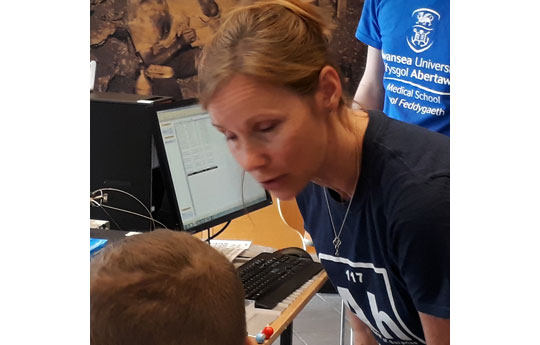Dr Ann Hunter
Swansea University, National Mass Spectrometry Facility
Analytical Chemistry & Mass Spectrometry
Swansea University, National Mass Spectrometry Facility
Analytical Chemistry & Mass Spectrometry
Hi, I’m Ann Hunter, Research Officerin the Centre for P450 Diversityand National Mass Spectrometry Facility(NMSF), Swansea University Medical School. I’m an analytical chemist, developing mass spectrometry (MS) and chromatography techniques forthe high resolution and accurate characterisation of a broad spectrum of chemical and biochemical compounds. I’m funded by BEACON(European Regional Development Fund through the Welsh Government) which focuses on the development of a viable Welsh bio-economy through the expansion of green supply chains.

I got hereby a pretty traditional route -loved all things Science at school, but was only any good at exams in Chemistry and so figured that a degree in something I enjoyed and which I had a fighting chance of gettingthrough the examswas a smart move.In my second year, I fell in love with analytical chemistry because a) it wasn’t full of stinky, smelly orange chemicals (this was organic chemistry in the late 80s after all!) and b) it was just brilliant playing with all sorts of amazing equipment and measuring things to find out what they were and how much of them there was in my sample.
This love was cemented in an undergraduateproject in which I was tasked with measuring the ethanol content in various alcoholic beverages by gas chromatography-mass spectrometry (GC-MS), a dream project for a student, and one which shaped my career as once I’dgraduatedI stayed on at Swansea University as a PhD student specialising in the analysis of biomolecules by mass spectrometry (nascent proteomics) with Prof Dai Games, the supplier of the multitudinous beverages,and several years and two Post Docs later came back toSwansea towork in the EPSRC National Mass Spectrometry Facility (NMSF) with Dr Jim Ballantyne who had been my Supervisorfor theproject.
In between, I was lucky enough carry out Post Doctoral Research in Medicinal Chemistry, looking at drug interactions with liver enzymesat the University of Washington in Seattle, and glycoprotein analysisin relation to diseasein Oxford University’s Glycobiology Institute.
Certainly Prof Games and Dr Ballantyne were hugely influentialin my choice of career and its development, but it started with a really great A-level Chemistry teacher, Dr Thomas, who just made it all make sense,and continued with lecturers at Swansea University who brought analytical chemistry alive for their students. I think we all continue to be inspired by people we respect and admire, who exudeenthusiasm for their chosen area of research or interest, and who are generous and skilful in sharing the joy of knowledge and of learning something new every day.
I think the most fascinating aspect to my work is the variety of interesting and challenging research that my colleagues in the NMSF and P450 group and I are ablesupportusing our extensive toolkitof instruments and techniques, coupled with the teams’ combined expertise in a range of diverse areas. Our aim is to be a readily accessible, University-wide resource for all researchers who might benefit.
Perhaps to advocate more open and collaborative resource and knowledge-sharing practices. The pressure of research assessment exercises, the treadmill of constant metrics production and evaluation protocols can result in a culture that merits ‘excellence’ alone, to the detriment of all that is not seen to be new or ‘on point’. Competition can foster invention, but not always in a healthy way, especially if it stifles open collaboration along the way. With the recent University of Wales’ publication of Prof Graham Reid’s review‘Strength in Diversity’, things do seem to be moving in the right direction, however.
Away from the lab, my familyand the activities we get up to arewhat it’s all about. We have a wonderful time making the most of the outdoors, cycling and walking, camping and water sportslike canoeing, surfing, water-skiing and wakeboarding and both pool and open water swimming – the joys of living in West Wales!
Don’t be afraid to get out there and try things, they may not work, or they might gowrong, but everyone makes mistakes, it’s a pretty good way to learn sometimes and quite honestly some really interesting things can come from messed up experiments -we only have to remember Sir Alexander Fleming and his accidental discovery of penicillinduring his research into influenza whenhe left his contaminated petri dish out by mistake.